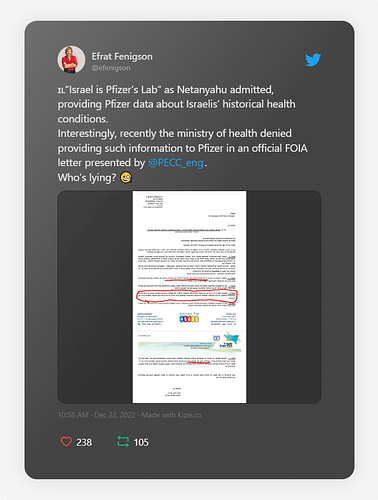Are you sure Israel is America’s ally at this point, or its Judas? Antichrist Israel Introduces Bill To Punish Christians With Jail Time For Proclaiming The Gospel Of Jesus Christ (Video) - The Washington Standard
EXCLUSIVE: Two Knesset members propose legislation to outlaw sharing the Gospel in Israel and send violators to prison – could it become law?
Is it possible that the Israeli government this year could pass legislation making it illegal for people to share the Gospel message in the very land where Jesus was born, raised, preached, died, buried and rose from the dead?
Unfortunately, yes.
As Palm Sunday and Easter approach – the two most sacred days on the calendar for those who follow Jesus as both God and Messiah – two members of the Knesset (Israel’s parliament) introduced a bill last week that would ban any and all efforts to tell people about Jesus.
The bill would send violators to prison.
Should it begin to gain traction inside the Knesset and begin moving towards passage, the bill could create a major new headache for Netanyahu's government by sparking a serious clash with Evangelical Christians in the United States and around the world who are among the biggest supporters of the State of Israel.
In the United States alone, there are some 60 million Evangelicals.
Globally, there are an estimated 600 million, according to the World Evangelical Alliance.
The bill could also draw sharp criticism from both Republicans and Democrats in Congress, in the executive branch, among U.S. governors and others who love Israel and have always stood with the Jewish state, but would fiercely oppose efforts to silence followers of Jesus in the Holy Land.
Former U.S. Ambassador of International Religious Freedom Sam Brownback – who served during the Trump-Pence administration – is the first American leader to publicly warn that this new bill poses a massive threat to free speech, human rights and religious freedom.
On Friday, ALL ISRAEL NEWS emailed Brownback – a long-time and consistent friend and supporter of Israel – a professional translation of the bill in English, which was originally written in Hebrew, of course.
Surprised and concerned, the ambassador replied with the following statement:
“Free and democratic countries simply do not outlaw the free exchange of ideas and that includes religious beliefs and convictions. Article 18 of the Universal Charter of Human Rights – which Israel has signed onto – guarantees freedom of religion, including the right to decide your own faith beliefs.”
WHAT DOES THE NEW BILL ACTUALLY SAY?
The proposed legislation would outlaw all efforts by people of one faith who, in any way, want to discuss or try to persuade people of other faiths to consider changing their current religious beliefs.
The punishment for doing so would be “one year imprisonment.”
If the conversation is with minor – someone under the age of 18 – the punishment would be “two years imprisonment.”
This bill would apply to people having spiritual conversations with Israelis of any religion.
However, in their official explanation of the bill, the two Israeli legislators specifically emphasized the warning to stop Christians, in particular.
The bill’s primary objective, therefore, appears to be making it illegal for followers of Jesus (“Yeshua” in Hebrew) to explain why they believe that Jesus is both Messiah and God with the hope that Israelis might consider following Him.
The bill does not only make a simple personal conversation about Jesus with another individual a crime.
It would also make it illegal for “someone who solicits a person – directly, digitally, by mail or online – in order to convert his religion.”
Thus, producing and publishing online videos explaining the Gospel to Jewish or Muslim people in Israel – and to those of any other religious faiths – would suddenly become illegal.
Publishing books, other printed literature, online articles, podcasts, or other forms of media that explains the life and ministry of Jesus and His message found in the New Testament would also become illegal.
So would discussing the Gospel message via email, text messages, written letters and/or on social media, including answering questions initiated by people who don’t follow Jesus.
[To read a professional translation of the bill – and its authors’ description of the bill’s intent – in English, please click here.]
[To read the bill and its description in the original Hebrew, please click here.]
It is already a crime in Israel to try to proselytize minors or bribe people of any age with money or material goods to change their religious views.
But this new legislation seeks to go much further.
“At times these attempts do not involve monetary promises or material gains and are therefore not illegal according to the current law,” the bill notes, “but the many negative repercussions, including psychological damages, warrant the intervention of the legislature.”
“Therefore, it is proposed that, alongside the prohibition of giving favors as an incentive to convert religion, also prohibited will be the act of solicitation to convert religion, when it is done directly to a person,” whether that be face-to-face or via any other means of communication.
WHO WROTE THIS ANTI-CHRISTIAN LEGISLATION?
The authors of this legislation, Moshe Gafni and Yaakov Asher, are ultra-Orthodox Jewish members of Knesset.
Both are members of United Torah Judaism (UTJ), a Haredi (highly religious) political party holding a total of seven out of 120 seats in the current Knesset.
And both are influential voices – and important votes – inside the 64-seat governing coalition led by Netanyahu.
Gafni is 70 years old. He was first elected to the Knesset in 1988 and has served almost continuously since then. Today, he serves as the chairperson of the Knesset’s powerful Finance Committee, as well as a member of the Foreign Affairs and Defense Committee and the Joint Committee for the Defense Budget.
Asher, age 57, was first elected to parliament in 2013. Today, he serves as chairperson of the Knesset’s Internal Affairs and Environment Protection Committee.
Gafni has a long history of opposing followers of Jesus.
He first introduced legislation to impose a legal ban on evangelism in Israel back in 1999.
His bill went nowhere, but Gafni has repeatedly re-introduced versions of his legislation ever since.
WILL NETANYAHU – A GREAT FRIEND OF EVANGELICALS – ALLOW SUCH ANTI-CHRISTIAN LEGISLATION TO PASS?
To his credit, Netanyahu has never allowed such legislation to advance or be approved in the past.
Nor has his center-right Likud party.
Why?
Because Netanyahu and most, if not all, members of the Likud party have always demonstrated that they are adamant about preserving and protecting the Jewish state as a liberal democracy.
They have always believed that even unpopular views must be allowed to be held and voiced in Israel, and that the rights of religious and ethnic minorities must be protected under the rule of law.
Netanyahu and Likud have, therefore, rejected such explicit breaches of freedom of speech, blatant violations of religious freedom and aggressive assaults on fundamental human rights.
What’s more, Netanyahu has proven himself as a great friend of Evangelical Christians over the past three decades.
While he does not agree theologically with Evangelicals about who Jesus is, Netanyahu has long viewed the Evangelical community as a true blessing and a strategic asset to the State of Israel and to the Jewish people worldwide.
That’s why for three decades Netanyahu has actively and consistently courted and cultivated strong support for Israel among Evangelical Christians, of which there are some 60 million in the United States and some 600 million worldwide.
Netanyahu meets regularly with Christian leaders from a wide range of denominations, and often speaks at Christian conferences and forums, including at the “Christian Media Summit,” organized by Israel’s Government Press Office each year in Jerusalem.
Just last year, I brought a delegation of Evangelical business and media leaders to meet with Netanyahu at the Knesset.
During his book tour several months ago, Netanyahu also spoke on numerous Christian TV networks, including TBN and CBN, the two most viewed Evangelical networks in the United States.
WHY COULD THIS YEAR BE DIFFERENT?
That said, Evangelical and Messianic Jewish leaders who have spoken to ALL ISRAEL NEWS in recent days say they are concerned that in the present political environment the legislation introduced by Gafni and Asher could actually become law.
They note that out of the 120-seat Knesset, the current government coalition is comprised of a large number of Orthodox and ultra-Orthodox members.
These members are far more aggressive in this legislative session than ever before in pushing for legislations to be passed that advance their theological worldview.
And these members appear to believe that Netanyahu cannot afford to lose their votes if he hopes to remain prime minister and hopes to advance his other important policy priorities, including stopping the Iranian regime from building nuclear weapons, making peace with the Kingdom of Saudi Arabia, strengthening and expanding the Israeli economy (especially as the U.S. economy slows), and passing sweeping judicial reforms.
Indeed, the current judicial reform movement raises further concerns for Evangelical and Messianic Jewish leaders.
Many believe reforms are, in fact, needed to improve Israel’s flawed legal system.
However, they worry that if the Knesset passes an extreme version of an “override clause” – one of the most controversial and hotly-debated of the proposed reforms which would allow the Knesset to override Israeli Supreme Court decisions with a simple majority vote of just 61 out of 120 Members – this could severely endanger the human rights and civil liberties of all minorities in the country, including religious minorities, such as followers of Jesus.
It would be a different matter if the “override clause” required a supermajority of, say, 90 seats in the Knesset to pass legislation previously struck down by the Supreme Court.
Even a compromise on the “override clause” issue could be both positive and acceptable, where the final legislation requires less than 90 votes but far more than 61 to overturn a Supreme Court decision.
But legislation that would allow a simple majority to overrule the High Court, they believe, poses a serious threat for a number of reasons.
For example, if the Gafni-Asher bill becomes law, the Supreme Court would likely strike it down as a violation of free speech, basic human rights and freedom of religion.
However, if the currently-proposed version of the “override clause” also becomes law, then a simple majority of just 61 Knesset members would be able to cancel the High Court’s decision.
That would enable the current Knesset to go forward with banning all forms of evangelism in Israel and would provide no legal recourse whatsoever to Jewish and Gentile people – Israelis or foreigners – who love Jesus and want to tell others about Him.





 Robert Gascoyne Cecil, 1830-1903*, looking more like a Jew*
Robert Gascoyne Cecil, 1830-1903*, looking more like a Jew* [According to the unknown author] the most powerful man currently in the conspiracy over this World is PEPE ORSINI of the powerful satanic Jewish/ Papal Bloodline. The Orsini are also known as Orso and the ancient Maximus family. There is no one more powerful than this figure who is really the Grey Pope. David Rothschild married into the Aldobrandini bloodline with the pretty Princess Olimpia Aldobrandini.
[According to the unknown author] the most powerful man currently in the conspiracy over this World is PEPE ORSINI of the powerful satanic Jewish/ Papal Bloodline. The Orsini are also known as Orso and the ancient Maximus family. There is no one more powerful than this figure who is really the Grey Pope. David Rothschild married into the Aldobrandini bloodline with the pretty Princess Olimpia Aldobrandini.

